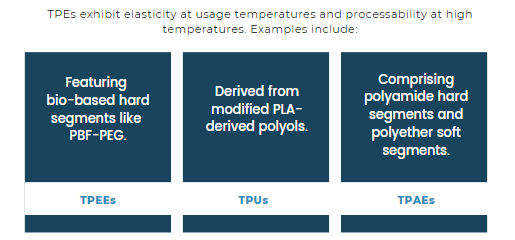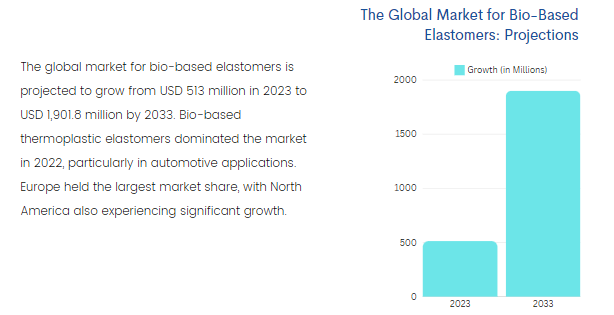Advancements and Market Trends in Bio-Based Elastomers
Introduction
Elastomers, characterized by their high elasticity and low modulus, are pivotal in industries such as aerospace, construction, and automotive. Traditionally derived from fossil fuels, the development of bio-based elastomers offers an environmentally friendly alternative, reducing carbon emissions and dependence on non-renewable resources.
Context and Subject Matter
Definition and Importance
Elastomers are polymers capable of returning to their original shape after deformation. Traditionally, commercial elastomers are synthetic and fossil-based. Bio-based elastomers, derived from renewable resources, are crucial in the shift towards sustainable materials, mitigating environmental impacts and enhancing resource efficiency.
Types of Bio-Based Elastomers
Bio-based elastomers are classified into:
Chemically Cross-Linked/Cross-Linkable Elastomers (CCEs):
- Natural Rubbers (NR)
- Bio-Based Synthetic Elastomers
Physically Cross-Linked Thermoplastic Elastomers (TPEs):
- Thermoplastic Polyester Elastomers (TPEEs)
- Thermoplastic Polyurethane Elastomers (TPUs)
- Thermoplastic Polyamide Elastomers (TPAEs)
Technological Developments
Chemically Cross-Linked/Cross-Linkable Elastomers (CCEs)
Natural Rubber (NR):
Composed of cis-isoprene, NR is used extensively in biomedical applications and high-performance tires. Modifications like epoxidized NR (ENR) enhance properties such as tear resistance and oil resistance.
Bio-Based Synthetic Elastomers:
Derived from bio-based monomers, these include conventional synthetic rubbers and novel elastomers like bio-based polyester elastomers.
Physically Cross-Linked Thermoplastic Elastomers (TPEs)

Patent and Publication Analysis
Patent Analysis
Key patents in bio-based elastomers include:
1. White Carbon Black/Poly(Itaconate-Isoprene-Glycidyl Methacrylate) Bio-Based Elastomer Composite Material
1. Patent Number: EP3323841B1
2. Assignee: Beijing University of Chemical Technology
3. Summary: This patent details an environment-friendly nanocomposite derived from non-petroleum materials, improving properties such as silica diffusion and mechanical strength.
2. Overmolding Thermoplastic Elastomer Compounds Having High Bio-Based Content
1. Patent Number: US20220010127A1
2. Assignee: Avient Corp
3. Summary: Describes thermoplastic elastomer compounds with high bio-based content, suitable for overmolding with good adhesion onto thermoplastic substrates.
Non-Patent Literature (NPL) Analysis
Key publications include studies on new bio-based thermoplastic polyurethane elastomers synthesized from isosorbide and rapeseed oil derivatives, showcasing advancements in synthesis and material properties.
Market Analysis
Market Growth and Trends

Key Market Players
Prominent companies in the bio-based elastomers market include:
ARLANXEO: KELTAN® ECO, a bio-based EPDM rubber with up to 70% ethylene from sugarcane.
RESELO: Reselo Rubber, produced from birch bark using biorefinery technology.
ARKEMA: Pebax® Clear 1200, a bio-based PEBA grade with 90% renewable carbon.
FKUR: Terraprene® CI 250 84A, a bio-based TPE with over 40% biobased carbon content.
BASF: Elastollan®N, a biobased ether-TPU elastomer.
Researchwire's Solution

Deliverables
The final output included:
- Detailed patent and NPL analysis.
- Comprehensive market analysis and competitor benchmarking.
- Insights into technological trends and key players.
- Visualizations of data and trends.
Conclusion
The comprehensive study conducted by Researchwire on bio-based elastomers was successfully delivered and well-received by the client. The detailed insights into technological advancements, market dynamics, and key players provided valuable information, aiding stakeholders in making informed decisions. The shift towards sustainable materials in the elastomer industry is both promising and essential, with bio-based elastomers playing a critical role in this transition.
Final Thoughts: Researchwire remains committed to delivering high-quality, comprehensive analyses that drive innovation and sustainability in the materials industry. The bio-based elastomer project exemplifies our expertise and dedication to supporting our clients’ strategic goals.
For further details and to access the complete report, please contact Researchwire.





